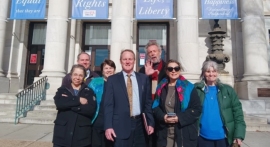
Last week, a former employee of CVS Pharmacy filed a lawsuit against the company, claiming that they discriminated against her after she sought religious accommodation from prescribing abortion-inducing drugs because of her Christian faith. The nurse, Robyn Strader, filed a discrimination case with the U.S. Equal Employment Opportunity Commission against CVS, which she accused of violating Title VII of the Civil Rights Act, which prohibits discrimination based on one's religious beliefs.
Now, CVS is defending itself, saying that they required nurses to perform "essential functions" of the job. CVS' Executive Director of Corporate Communications Mike DeAngelis told the Christian Post that while they cannot comment on a "specific complaint filed with EEOC," the national drug store chain has "a well-defined process in place for employees to request and be granted a reasonable accommodation due to their religious beliefs, which in some cases can be an exemption from performing certain job functions."
DeAngelis explained however that it was impossible to "grant an accommodation that exempts an employee from performing the essential functions of their job." He added that the company continues to "enhance" its MinuteClinic services by offering "more holistic care on top of providing urgent care.
DeAngelis explained further that "educating and treating patients regarding sexual health matters - including pregnancy prevention, sexually transmitted infection perfection, and safer sex practices" are part of the "essential job functions of our providers and nurses."
The CVS director concluded, "We cannot grant exemptions from these essential MinuteClinic functions."
But First Liberty Counsel Christine Pratt, who represents Strader, argued that CVS from the very beginning "agreed to accommodate her religious beliefs" when the nurse asked not to prescribe contraception. Pratt pointed out that Strader was able to work at the company for 6.5 years without any issues. Moreover, when a patient would ask for contraception, Strader would refer them to another nurse or another CVS MinuteClinic just two miles away.
On August 26, 2021, however, CVS announced that "all nurses must perform essential services related to pregnancy prevention," which included contraception. Shortly thereafter, Strader's manager told her that the company would "no longer honor religious accommodations regarding pregnancy prevention services." She was even told that she had "no religious accommodation on file with CVS."
A month later on September 23, Strader was informed that if she did not change her beliefs on contraception, CVS would end her employment on October 31. Pratt reported that Strader's manager "repeatedly pressured" the nurse to change her beliefs, all while CVS refused to respond to three letters the nurse sent requesting a religious accommodation.
Pratt accused CVS of violating Title VII of the Civil Rights Act of 1964 when it not only ignored her requests for religious accommodations but also refused to consider her request for an ongoing religious accommodation. She added that they also "terminated her because of her religious beliefs."
This is not the first time CVS has been embroiled in a discrimination issue. In April 2021, Bloomberg Law reported that a transgender North Carolina pharmacist named Olivia Buckoski claimed having experienced "a systemic and persistent campaign of discrimination" from managers, co-workers, and customers of CVS. Buckoski filed an administrative charge with the U.S. Equal Employment Opportunity Commission on April 19, 2021. Buckoski claims CVS failed to intervene to stop verbal harassment from customers and coworkers who repeatedly used the wrong name and gender.
Back in 2015, four former CVS workers sued the pharmacy chain in a potential class action lawsuit that claimed its New York City stores racially profiled African-American and Hispanic shoppers using racial slurs, ABC News reported. The four former employees said they were "routinely" told to "follow that black guy" without any evidence that he was a shoplifter or attempted to steal. Three of the four complainants also alleged racial discrimination against themselves.




















